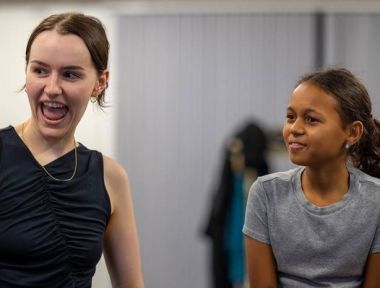15th December 2022
ALWF scholarship recipient receives 5 star review
We are delighted to be sharing news of Emma Prendergast, ALWF scholarship recipient, who graduated from Bristol Old Vic Theatre School in 2018.
Emma is currently appearing as Mrs Cratchit and Belle in Hull Truck’s ‘A Christmas Carol’ which has received a 5 star review from The Stage
Emma’s interview with Hull Truck can be found below:-
How do you show your relationship in the show as Mr & Mrs Cratchit...Do you both communicate together using BSL?
The Cratchits are a pretty typical example of a family in Hull, doing everything they can to provide the best life for their children. They are a Deaf empowered family and happen to use British Sign Language as their main form of communication. Like many other families, their ways of communicating vary; sometimes Mrs Cratchit uses BSL, sometimes speech with her children, as well as incorporating signs that are personal to the family. For example, I learnt BSL in London, and have had to pick up some signs that are specific to BSL in the north! Additionally, because of the setting of the play, we’re able to explore the socio-political side of what it means to be Deaf in Dickensian Britain. This show opens up the spectrum of communication possibilities within the Deaf community in public and at home. It asks the question: who has permission, thanks to their position in Dickensian society, to employ the form of communication that empowers them best?
Do you think there is a lack of opportunity for Deaf and Disabled people in the performing arts, what would you like to see theatres do to make positive changes?
There is definitely a lack of opportunity for Deaf and Disabled people in the performing arts at the moment. Interestingly, there is more awareness than there has ever been, but that awareness needs to become opportunity and that opportunity needs to become equity. Whilst Deaf and Disabled artists have always been here, there has been a rise in visibility in the last few years. This visibility is crucial in inspiring young Deaf and Disabled people into entering the arts, but this awareness must now become representation and advocacy. Across the country, Deaf and Disabled people are still being used in a tokenistic way, and theatres have a lot of work to do to make positive change. This means not just employing Disabled artists but being willing to listen and learn from their experiences. Theatres must pay Deaf and Disabled individuals for their time to find working solutions to the barriers that these artists face in the industry. This information must then be retained, so that future generations of Disabled people have an accessible framework to step into, rather than having to educate and inform at their own expense.
How did you go about beginning and maintaining a career in the arts?
I was lucky enough to be offered a place at Bristol Old Vic Theatre School at the age of 18. I spent two years of the pandemic working self-represented and this allowed me to focus my energy into projects I really wanted to do; working with a variety of accessible theatre companies that focus on people-led, Disabled-led and Queer-led stories. For me, maintaining a career in the arts is about knowing what stories you are interested in telling and then working hard to tell them! With every project, you learn and grow and discover more and this confidence allows you to sustain a positive approach in this industry. I find the more I show people who I am and tell people what I need to thrive in a rehearsal room, the more artistically free and connected I feel to the work itself. I like to approach every project like I approach most things, with a deep sense of joy and optimism.

